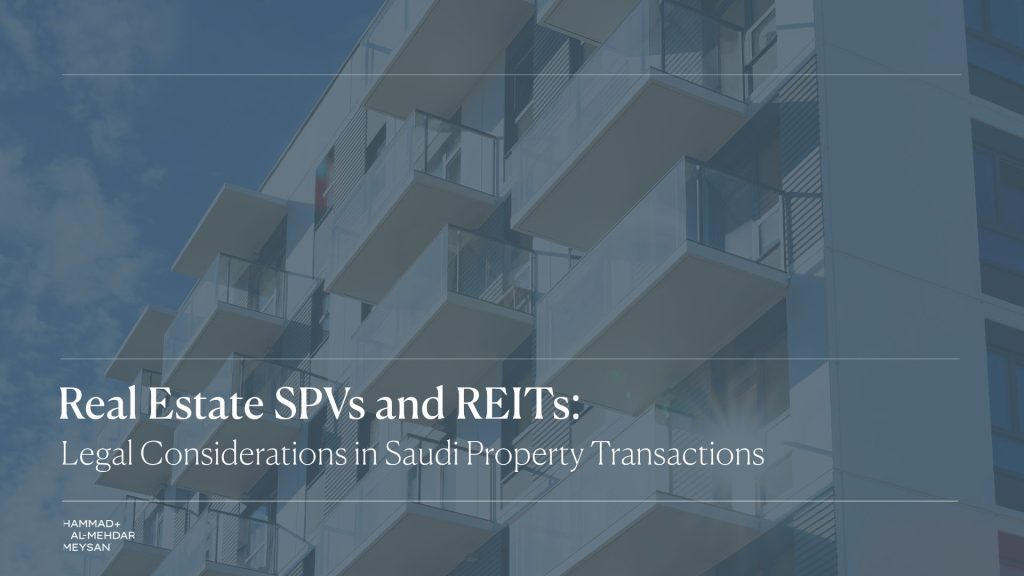
Saudi Arabia’s property market is undergoing a profound transformation, fuelled by Vision 2030 initiatives, giga-projects, and increasing foreign and institutional participation. Real estate has become one of the most dynamic asset classes in the Kingdom, offering opportunities for domestic and international investors alike. Against this backdrop, structuring vehicles such as special purpose vehicles (SPVs) and real estate investment trusts (REITs) has emerged as a key tool in facilitating real estate investment and transactions. However, these structures bring their own legal and regulatory considerations that investors must navigate to ensure compliance and protect value.
SPVs in Real Estate Transactions
SPVs are commonly used in real estate to isolate risks, ring-fence assets, and streamline ownership structures. In Saudi Arabia, they are often incorporated to acquire, develop, or holding a specific real estate asset. This allows investors to separate liabilities associated with the project from their wider business, enhancing both risk management and financing flexibility.
An SPV can also facilitate joint ventures, particularly where foreign investors seek to partner with Saudi entities. By confining rights, obligations, and cash flows within a dedicated vehicle, the SPV simplifies governance and exit options. However, investors must ensure that the SPV is adequately licensed and complies with foreign investment restrictions. Approvals from the Ministry of Investment of Saudi Arabia (MISA) may be required where non-Saudi investors hold equity.
Legal and Regulatory Framework for SPVs
- The incorporation of SPVs is governed by the Saudi Companies Law, which sets out requirements for shareholding, governance, and reporting. Investors must also consider:
- Licensing: Foreign investors require MISA approval for direct or indirect ownership of real estate assets, except where exemptions apply.
- Sector-Specific Restrictions: Certain property types, such as land in Makkah and Madinah, are subject to foreign ownership limitations.
- Financing and Security: Mortgages and security interests must be registered with the Unified Real Estate Registry and the Ministry of Justice to be enforceable.
- Tax and Zakat: SPVs are subject to corporate tax where foreign-owned and to zakat where Saudi- or GCC-owned, with implications for structuring joint investments.
SPVs therefore offer flexibility, but their establishment and operation require careful attention to licensing, ownership, and regulatory compliance.
REITs as a Structuring Tool
REITs, introduced into Saudi Arabia in 2016, provide a regulated framework for collective investment in income-generating real estate. They allow investors to access real estate markets without directly owning or managing assets, offering liquidity through public listing on the Saudi Stock Exchange (Tadawul).
- REITs are governed by the Capital Market Authority (CMA) and must meet detailed requirements, including:
- Diversification: Limits on concentration of assets and obligations to invest primarily in developed, income-producing properties.
- Distribution: Mandatory annual distribution of a significant portion of net income to unitholders.
- Transparency: Strict disclosure requirements, including valuation standards, periodic reporting, and governance obligations.
- Leverage: Restrictions on borrowing to mitigate systemic risks.
These requirements make REITs attractive to institutional investors seeking regulated exposure to Saudi real estate. However, compliance with CMA rules and ongoing reporting obligations can present operational challenges, particularly for sponsors unfamiliar with capital markets regulation.
Key Legal Risks in Structuring
When deploying SPVs or REITs in property transactions, investors must navigate several legal risks:
- Foreign Ownership Restrictions: Limitations on property ownership in certain regions may restrict structuring options.
- Regulatory Approvals: Both MISA and CMA approvals may be required, depending on the structure and asset class.
- Taxation: Cross-border transactions can give rise to withholding tax on dividends, royalties, or management fees; double taxation treaty protections should be considered.
- Governance Risks: Poorly drafted shareholders’ agreements in SPVs or inadequate compliance frameworks in REITs can create disputes or regulatory penalties.
- Exit Strategy: For SPVs, clarity around share transfers and valuation mechanisms is critical, while for REITs, liquidity is tied to market conditions and regulatory requirements.
Dispute Resolution and Enforcement
Dispute resolution in real estate SPVs and REITs often centres on shareholder disagreements, financing arrangements, or regulatory compliance. Arbitration is commonly used, and Saudi Arabia’s adoption of the New York Convention ensures the enforceability of arbitral awards, subject to Sharia principles. For REITs, disputes may also involve regulatory enforcement actions by the CMA, requiring sponsors and managers to adhere strictly to compliance obligations.
Strategic Opportunities
The growing use of SPVs and REITs reflects Saudi Arabia’s maturing investment ecosystem. SPVs offer bespoke, flexible ownership and financing structures, while REITs provide transparency, liquidity, and regulated access to the property market. Both are instrumental in unlocking capital, attracting foreign participation, and facilitating investment in landmark developments and income-producing portfolios.
As Saudi Arabia continues to reshape its real estate sector, SPVs and REITs are becoming indispensable structuring tools for both local and international investors. However, they present distinct legal and regulatory challenges that must be managed carefully to ensure compliance, protect investment value, and achieve strategic objectives. By anticipating these challenges at the outset of a transaction, investors can successfully harness these vehicles to participate in one of the region’s most dynamic property markets.
